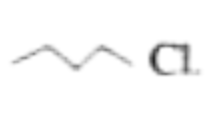In the following pairs of halogen compounds, which would undergo SN2 reaction faster ?


It is primary halide and therefore undergoes SN2 reaction faster.
 As iodine is a better group because of its larger size, it will be released at a faster rate in the presence of incoming nucleophile.
As iodine is a better group because of its larger size, it will be released at a faster rate in the presence of incoming nucleophile.
Topper's Solved these Questions
Similar Questions
Knowledge Check
Nucleophilic substitution reactions are of two types, substitution nucleophllic bimolecular (SN2) and substitution nucleophilic unimolecular (SN1) depending on molecules taking part in determining the rate of reaction. Reactivity of alkyl halide towards SN1 and SN2 reactions depends on various factors such as steric hindrance, stability of intermediate or transition state and polarity of solvent. SN2 reaction mechanism is favoured mostly by primary alkyl halide then secondary and then tertiary. This order is reversed in case of SN1 reactions.
In the following pairs of halogen compounds, which would undergo SN2 reaction faster.AIdobutaneBChlorobutaneCBromobutaneDNone of the aboveNucleophilic substitution reactions are of two types, substitution nucleophllic bimolecular (SN2) and substitution nucleophilic unimolecular (SN1) depending on molecules taking part in determining the rate of reaction. Reactivity of alkyl halide towards SN1 and SN2 reactions depends on various factors such as steric hindrance, stability of intermediate or transition state and polarity of solvent. SN2 reaction mechanism is favoured mostly by primary alkyl halide then secondary and then tertiary. This order is reversed in case of SN1 reactions.
In the following pairs of halogen compounds, which would undergo SN2 reaction faster.AIdobutaneBChlorobutaneCBromobutaneDNone of the aboveNucleophilic substitution reactions are of two types, substitution nucleophllic bimolecular (SN2) and substitution nucleophilic unimolecular (SN1) depending on molecules taking part in determining the rate of reaction. Reactivity of alkyl halide towards SN1 and SN2 reactions depends on various factors such as steric hindrance, stability of intermediate or transition state and polarity of solvent. SN2 reaction mechanism is favoured mostly by primary alkyl halide then secondary and then tertiary. This order is reversed in case of SN1 reactions.
In the following pairs of halogen compounds, which would undergo SN2 reaction faster.AIdobutaneBChlorobutaneCBromobutaneDNone of the above
In the following pair of halogen compounds which would undergo SN2 reaction faster?


View SolutionIn the following pair of halogen compound, which would undergeo , SN2 reaction faster .
(i)
(ii) CH3CH2CH2CH2IandCH3CH2CH2CH2Cl
View SolutionIn the following pairs of halogen compounds, which compound undergoes SN1 reaction faster?

View SolutionNucleophilic substitution reactions are of two types, substitution nucleophllic bimolecular (SN2) and substitution nucleophilic unimolecular (SN1) depending on molecules taking part in determining the rate of reaction. Reactivity of alkyl halide towards SN1 and SN2 reactions depends on various factors such as steric hindrance, stability of intermediate or transition state and polarity of solvent. SN2 reaction mechanism is favoured mostly by primary alkyl halide then secondary and then tertiary. This order is reversed in case of SN1 reactions.
In the following pairs of halogen compounds, which would undergo SN2 reaction faster.
View SolutionNucleophilic substitution reactions are of two types, substitution nucleophllic bimolecular (SN2) and substitution nucleophilic unimolecular (SN1) depending on molecules taking part in determining the rate of reaction. Reactivity of alkyl halide towards SN1 and SN2 reactions depends on various factors such as steric hindrance, stability of intermediate or transition state and polarity of solvent. SN2 reaction mechanism is favoured mostly by primary alkyl halide then secondary and then tertiary. This order is reversed in case of SN1 reactions.
In the following pairs of halogen compounds, which would undergo SN2 reaction faster.
View Solution

